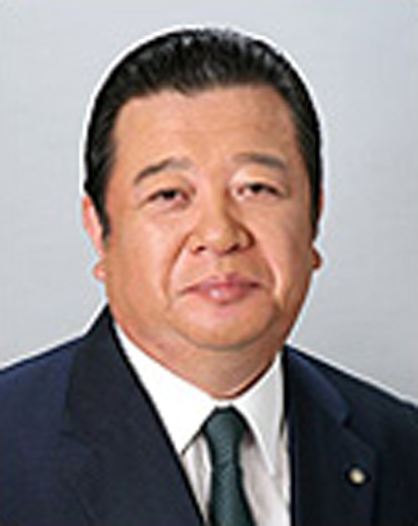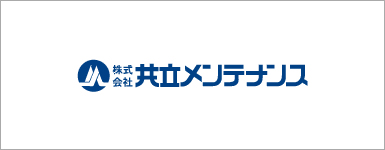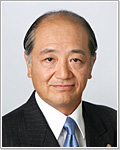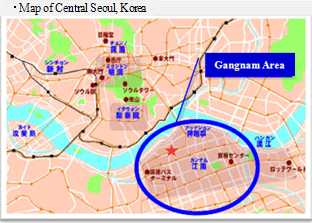| Kyoritsu Maintenance Co., Ltd. (9616) |
|
||||||||||||||
Company |
Kyoritsu Maintenance Co., Ltd. |
||
Code No. |
9616 |
||
Exchange |
TSE 1st Section |
||
Chairman |
Haruhisa Ishizuka |
||
President |
Mitsutaka Sato |
||
HQ Address |
Soto Kanda 2-18-8, Chiyoda-ku, Tokyo |
||
Year-end |
March |
||
URL |
|||
* Share price as of closing on December 12. Number of shares outstanding as of most recent quarter end, do not include treasury shares.
|
||||||||||||||||||||||||
|
|
* Estimates are those of the Company.
This Bridge Report provides details of Kyoritsu Maintenance Co., Ltd. and a review of first half earnings.
|
| Key Points |
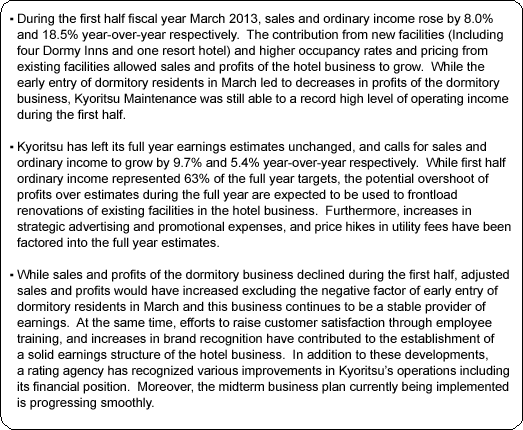 |
| Company Overview |
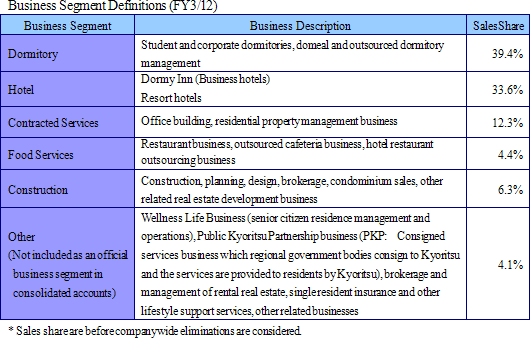 <Corporate History>
Kyoritsu Maintenance was established in September 1979. The founder, Haruhisa Ishizuka, had long been associated with the food service industry and started the Company by taking on the operations of corporate cafeteria facilities on a consigned basis. In the following year in 1980 in Sakura City, Chiba Prefecture, the Company established a two story wooden structure with 28 small four Japanese straw mat rooms as its first dormitory facility. Based on the principle of providing "food" that "fosters the health and well being of students to put their parents' minds at ease," Kyoritsu was able to steadily expand its student dormitory business through partnerships with various schools. The Company steadily expanded its operating territory to cover the Tokyo, Kanagawa, Nagoya and Osaka regions. In April 1985, Kyoritsu began offering employee dormitories that offered highly unique features of "individual rooms with commissary functions providing breakfast and dinner," and "large bathing facilities" as comforting amenities for residents. In June 1993, the Company moved its headquarters to its current location and in July of the same year they entered the resort hotel business with the opening of a facility in Nagano Prefecture, followed by their entry to the business hotel realm in August with the opening of a facility in Saitama Prefecture. In September 1994, Kyoritsu listed its shares on the JASDAQ Market (At the time called the OTC Market), in March 1999 it moved its listing to the Second Section of the Tokyo Stock Exchange, and then to the First Section in September 2001.
|
| "Kyoritsu Value Up Plan!" Midterm Business Plan |
 (1) Accelerate Growth in Its Core Business
① "Tokyo Region Dormitory 98 Project"
The "Tokyo Region Dormitory 98 Project" is a plan that calls for efforts to raise occupancy rates in the Tokyo metropolitan region, which accounts for 65% of the total dormitory capacity, to 98% at the start of the term (95.6% in FY3/13).
 ② Pinpoint Development
With regards to development, Kyoritsu is developing facilities in areas that are in high demand by clients (Universities, companies) as part of a focused "pinpoint" facility development strategy. As part of this strategy, collaboration with financial institutions, real estate companies, trading companies, and general contractors is being strengthened to expand the breadth of information obtained. Furthermore as an exit strategy, a "sale and lease back plan" is being implemented to increase the liquidity of assets. Moreover, the announcement effect of asset sales to J-REITs in fiscal year March 2011 led to a pronounced increase in inquiries to purchase the company' s assets (Asset sales in fiscal year March 2011 and 2012 totaled ¥14.0 and ¥4.8 billion respectively).
 ③ Dormy Inn Overseas Deployment
In order to capture new opportunities for growth, Kyoritsu is considering the overseas deployment of its businesses. The Company is currently preparing for the opening of its first overseas Dormy Inn business hotel called the "Dormy Inn PREMIUM Seoul Garosugil Street" in Seoul, Korea in June 2014.
(2) Cultivating New Businesses
During fiscal year March 2012, the Public Kyoritsu Partnership business was launched. This business provides integrated services ranging from consulting to outsourcing designed to match the needs of regional governments undergoing administrative and fiscal reforms. Kyoritsu will take on the non-core services of the government, and contribute to the administrative and fiscal reforms by leveraging its knowhow to reduce costs, provide stable regional employment opportunities, and improve resident services. During the first year of operations in fiscal year March 2012, Kyoritsu was able to capture 37 contracts for consigned management from 16 regional government bodies including those in Yubetsucho, Hokkaido and Hidakagawacho, Wakayama Prefecture for sales of ¥910 million. During fiscal year March 2013, the number of government bodies and contracts for outsourcing services is expected to rise to 64 and 104 respectively and sales to grow to ¥3.06 billion. Currently Kyoritsu has already contracted ¥1.6 billion in sales from this business.
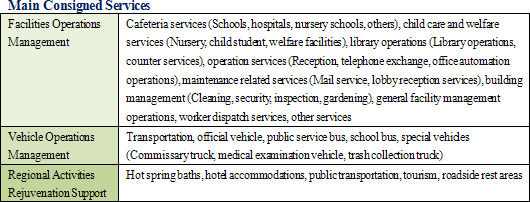 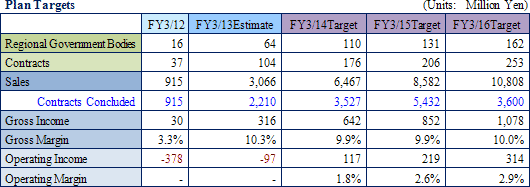 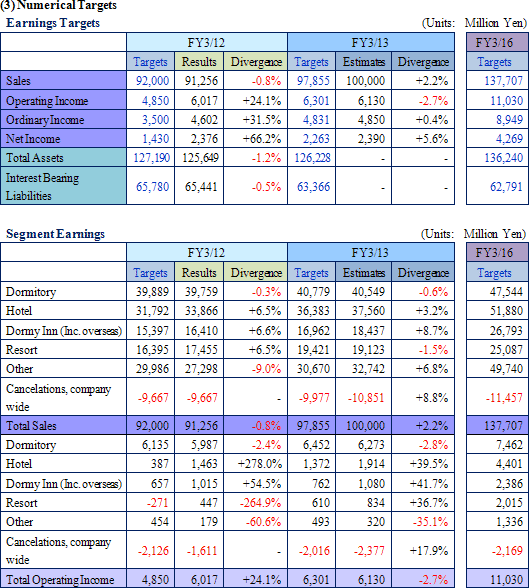 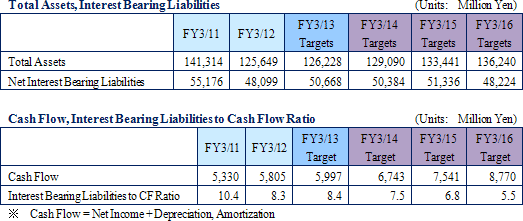  |
| First Half Fiscal Year March 2013 Earnings Results |
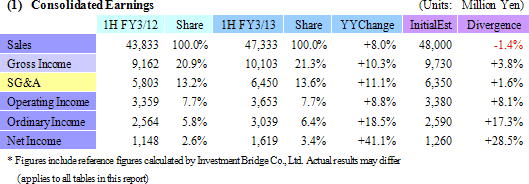 Hotel Business Drives Growth, Sales and Ordinary Income Rise 8.0% and 18.5%
Sales rose by 8.0% year-over-year to ¥47.333 billion. An increase in the number of residents moving into dormitories earlier than normal in March allowed sales of the dormitory business segment to remain in line with the previous year's level. At the same time, the contribution of new facilities (Four Dormy Inn and one resort hotel) and favorable trends at existing facilities (Occupancy rates, customer numbers, and Average Daily Rate (ADR) all rose) allowed hotel business segment sales to rise by 16.4% year-over-year. Operating income also rose by 8.8% year-over-year to ¥3.653 billion. Operating income of the hotel business segment rose by 62.2% year-over-year due to increases in the number and ADR at both the business and resort hotel facilities. This performance helped to offset declines in dormitory business segment operating income due to declines in new resident contract fees arising from increases in early entry of residents in March and increases in public utility fees. Profit from sales of marketable securities (¥63 million) and declines in interest payment (Falling from ¥747 to ¥642 million) allowed non-operating income to improve. At the same time, profit from sale of fixed assets and declines in losses from sales of marketable securities (Fell from ¥251 to ¥198 million) contributed to improvement in extraordinary income and allowed net income to rise by 41.1% year-over-year to ¥1.619 billion.
Divergence from Initial Estimates
While sales remained basically in line with initial estimates, operating income exceeded estimates by ¥273 million. The business hotel saw a ¥258 million increase in segment operating income over estimates due to higher occupancy rates and pricing, and resort hotel operations recorded a ¥102 million rise in operating income over estimates due to higher occupancy rates. Reviews of rental fees contributed to a ¥93 million increase in segment operating income over estimates in the dormitory business. At the same time, delays in booking of sales for some projects in the construction business into the second half (¥84 million below the estimates) and increased costs associated with the fortification of marketing activities for the PKP business (¥109 million) contributed to shortfall of estimates for these segments.
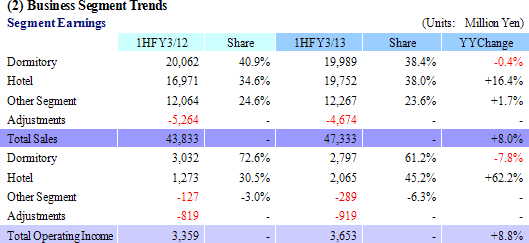 Dormitory Business: Sales and Operating Income Decline by 0.4% and 7.8% YY to ¥19.989 and ¥2.797 Billion
Marginal profit increased by ¥342 million due to increases in occupancy rates, which started out the year at high levels (Up from 95.3% in the previous term to 96.5%). However they could not offset the influence of early entry of dormitory residents in March (¥279 million in revenues which would have traditionally been booked in April was booked in March of the previous term), declines in large foreign student resident contracts (¥108 million, with contracts varying by about ¥100 million each year), increases in public utilities fees (¥109 million), and rises in promotional and other costs (¥81 million). As of end September, the number of resident contracts rose by 779 from the same period in the previous term to 29,481. Because second half revenues will be positively influenced by the early entry of residents in March, the dormitory business segment is expected to see growth in both sales and profits during the full year. Despite the addition of 1,200 new rooms to overall capacity anticipated in fiscal year March 2014, occupancy rates, which are an indicator for future business trends in the dormitory business, are currently trending around a high 97%.
 Hotel Business: Sales, Operating Income Rise by 16.4% and 62.2% to ¥19.752 and ¥2.065 Billion
By business segment, sales of the business hotel and resort hotel operations rose by 15.2% and 17.3% year-over-year to ¥9.633 and ¥10.119 billion respectively. Four new Dormy Inn and one new resort hotel were opened during the term, bringing the number of business and resort hotels and rooms to 49 and 8,149 and 19 and 1,964 respectively. With regards to profits, hotel business segment operating income rose by ¥792 million from the same period in the previous term, with business hotels operations contributing with a ¥415 million year-over-year increase (Existing facilities saw an improvement of ¥351 million, while operating and other costs led to a negative ¥64 million) and resort hotels operations contributing with a ¥377 million year-over-year increase (Existing facilities saw an improvement of ¥393 million, while operating and other costs led to a positive ¥16 million). Moreover, Kyoritsu was able to acquire first place ranking in both the business hotel category of the JCSI (Japanese Customer Satisfaction Index) and the J.D. Power Asia Pacific 2012 Japan Hotel Service Customer Satisfaction Survey for hotels under ¥9,000 per night in reflection of the continued favorable reception of its facilities and services by the market.
   Other Business: Sales Rise 1.7% to ¥12.267 Billion, Operating Loss Expands to ¥289 Million From ¥127 Million in Previous Year
Improvements in restaurant and cafeteria outsourcing services operations profitability contributed to a rise in sales and a reduction in the operating loss of the food services business. Despite an increase in sales, a deterioration in profitability of the contracted services business due to cancelations of large contracts led to an operating loss (Operating income recorded in previous term). Construction business also suffered from delays in ongoing construction projects into the second half, causing sales to decline and an operating loss to be incurred (Operating income seen in previous term). Sales of the PKP business rose, but anticipatory investments contributed to an increase in operating losses.
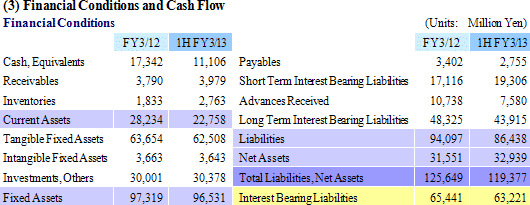 With regards to cash flow, the margin of the net outflow in operating cash flow declined on the back of declines in working capital arising from higher profit and inventories despite increases in tax expenses (Up from ¥945 to ¥1,541 million). At the same time, the margin of net outflow in investing cash flow expanded on the back of declines in the amount of tangible fixed assets sold and payments for security deposits (A large net outflow was recorded in financing cash flow during the first half of fiscal year March 2012 due in large part to the redemption of bonds.) Capital investments during the first half declined to ¥1.492 billion from ¥2.565 billion in the previous first half. Depreciation also fell to ¥1.462 billion from ¥1.669 billion. During the full fiscal year, ¥6.0 billion in real estate asset liquidation is expected (Compared with ¥14.0 and ¥4.8 billion in FY3/11 and FY3/12).  ① The outlook for Kyoritsu to maintain stable earnings in the future (Stable earnings generation of the main dormitory business) ② The establishment of the hotel business as a stable earnings driver (Establish the earnings foundation for the hotel business) due to successful fortification of management and implementation of cost controls. ③ While new capital investments for the dormitory and hotel businesses continue, success in the strategy of striking a healthier financial balance has been achieved.  |
| Fiscal Year March 2013 Earnings Estimates |
 Full Year Earnings Estimates Remain Unchanged, Sales and Ordinary Income Expected to Rise by 9.7% and 5.4%
Sales are expected to rise by 9.7% year-over-year to ¥100.0 billion. The contribution from newly opened facilities will lead to growth in sales of both the dormitory and hotel business, and the PKP business and others are also expected to record higher sales. With regards to profits, increases in public utility expenses due to price hikes, strategic advertising to establish the Kyoritsu Maintenance brand, higher system depreciation expenses, and consigned services fees for the establishment of a special subsidiary designed to promote employment of handicapped people are factors behind the relatively low 1.9% year-over-year growth in operating income. Furthermore, while operating income exceeded first half estimates by ¥273 million, this increase over estimates will be used for front loaded refurbishment of facilities in the hotel business (¥200 million for business hotels, and ¥100 million for resort hotels). Capital investments are expected to decline from ¥3.957 billion in the previous term to ¥3.690 billion in the current term, and depreciation to rise from ¥3.429 billion to ¥3.569 billion.
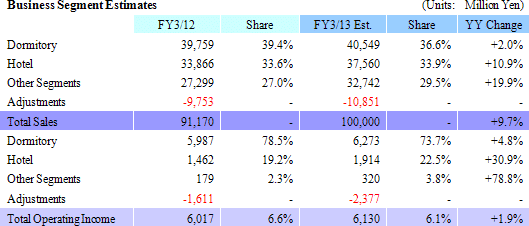   |
| Conclusions |
|
Aside from the core businesses, Kyoritsu has become a supporter of the "Hakone Ekiden" long distance relay race for university students to be held over the upcoming New Year holidays. This Hakone Ekiden relay race is held every year between top level universities in the Kanto region with the first leg of the run from Tokyo to Hakone held on January 2, and the return leg on January 3. This relay is broadcast on major television networks so the sponsorship of the race and related television commercials by Kyoritsu will serve as a great opportunity for the "Kyoritsu Maintenance" brand to be seen by a wide range of viewers. These promotional activities are a reason for the decline in profitability during the second half over the first half, with strategic advertising to establish the Kyoritsu Maintenance brand of ¥180 million factored into second half earnings. Despite the decline in birthrates, the rate of advancement of students to four year universities is on the rise and efforts to develop new four year university clients since 2006 have proven successful (The number of dormitory resident contracts from four year universities has risen from 29.6% of all contracts in FY3/06 to 52.0% in FY3/13). Therefore the decision to become a supporter of the "Hakone Ekiden" long distance relay run of university students is expected to enable Kyoritsu to cultivate new four year university clients. Disclaimer
This report is intended solely for information purposes, and is not intended as a solicitation to invest in the shares of this company. The information and opinions contained within this report are based on data made publicly available by the Company, and comes from sources that we judge to be reliable. However we cannot guarantee the accuracy or completeness of the data. This report is not a guarantee of the accuracy, completeness or validity of said information and or opinions, nor do we bear any responsibility for the same. All rights pertaining to this report belong to Investment Bridge Co., Ltd., which may change the contents thereof at any time without prior notice. All investment decisions are the responsibility of the individual and should be made only after proper consideration.Copyright(C) 2013 All Rights Reserved by Investment Bridge Co., Ltd. |

